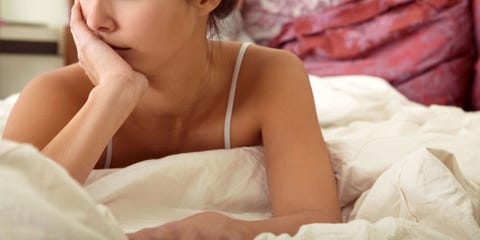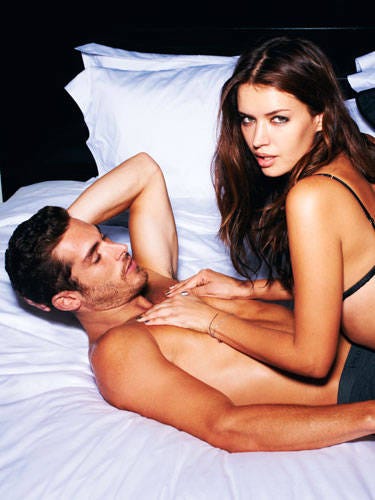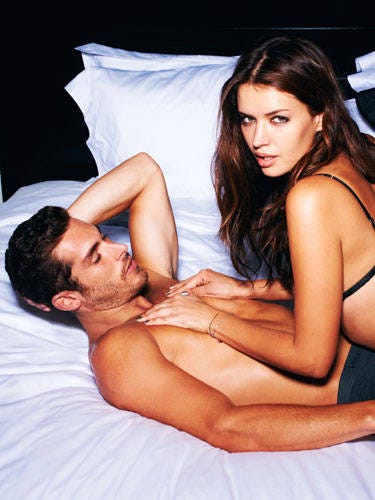 Alison, 21, has struggled with depression since she was a child and started taking antidepression medication when she was 11. One of the side effects of that medication is an inability to orgasm. Here, Alison opens up about what it's like living in a world where people assume if you can't orgasm, it's because you haven't tried hard enough.
Alison, 21, has struggled with depression since she was a child and started taking antidepression medication when she was 11. One of the side effects of that medication is an inability to orgasm. Here, Alison opens up about what it's like living in a world where people assume if you can't orgasm, it's because you haven't tried hard enough.
When I was a kid growing up in Minnesota, I was anxious about everything. I was bullied often in school, and it just got worse and worse. One day in fifth grade, the bullying got so bad that I just started crying in a corner of a classroom and found a letter opener on the teacher's desk. I didn't do anything with it, but I kept holding it and thinking about harming myself, and then a teacher came back in and saw me and called the nurse. That was when my parents decided to bring me to the doctor and diagnosed me with major depression. I went to go see a therapist as well and then was put on medication the summer before sixth grade.
I think we started with Celexa and Cymbalta, and I credit those with helping with my self-harm ideations because fortunately I never went through with any of those thoughts. If I had not started taking medication in sixth grade, I'm not sure I would be where I am now (I'm in a good college and doing well), and I also don't know if I would be alive.
As a teenager, I don't remember getting much of a sexual education. All of my friends were nerds, so I had no idea if my peers were even having sex, and masturbation wasn't really something I was familiar with. I just assumed I'd get a boyfriend someday, but that didn't happen until after high school. I can see now that since SSRIs [the type of antidepressants Alison was taking] can affect your sex drive, the fact that I didn't have a strong sexual desire back then isn't that surprising. 

Before I got to college, I hadn't even kissed anyone. In high school, I'd wanted to have a boyfriend, but that just wasn't happening for me, so I'd kind of given up on it. I didn't think guys would want to date me because I didn't have sexual experience. My senior year, I started using OkCupid.
When I was 18, I met a guy on OkCupid who was in his late 20s, and we messaged each other for a few weeks. One night, I went over to his apartment, and we had sex the first night we met in real life. I lost my virginity to him. It wasn't great, but I thought your first time wasn't supposed to be. We dated for a couple months, but eventually the relationship just got really unhealthy, and we broke up.
After my first few sex partners, I assumed that my inability to orgasm was because I was doing something wrong during sex. I tried using a vibrator but wasn't getting anywhere with that, and I tried touching myself but that didn't seem to do anything for me either. It hadn't occurred to me that it might not be my fault until I came across an essay by a young woman about her experience with SSRIs and anorgasmia (the inability to orgasm), and it was like reading my own diary. I finally felt like, "Oh, OK. It's not my fault. This is just the way it is."
I started telling guys before we fooled around, "I have anorgasmia, so I'm going to have fun but it's not gonna be 'over' at any point for me." And one guy said something like, "Oh, no, I'll make you orgasm," and I was like, "No. Biologically you will not." That guy just sort of took it as a challenge to keep going until he made me have an orgasm and then got really annoyed at me when I didn't. If you have anorgasmia and you're sleeping with a guy who is really trying to give you an orgasm, they feel a little lost. I can't blame them for that feeling either because I don't know what they're supposed to do any more than they do.
After that, I went to my doctor and asked if I could change medications to try and fix the problem, but she said that unfortunately with SSRIs, there's not one medication that could wipe out that side effect, and if I changed medications, I could change a lot of other things in my brain that could really hurt me. I still figured it had to be worth a shot though, so I switched to Lexapro. It was a really bad idea. I became suicidal while I was on it, and then about a month later, we switched to Zoloft, and that was much better.
Now I really enjoy all of the parts of sex that most people enjoy before they orgasm and find that process to be exciting and satisfying in its own way. I also have really vivid sex dreams that work the same way, in that I don't have an orgasm after, but I still get aroused and experience pleasure from them.
While it's still hard to date guys who either take my anorgasmia as a challenge or get angry at me for not being able to orgasm, dealing with the judgment I feel from my female friends is worse. My roommate once casually asked me if I ever had sex, because she was always having guys over and I wasn't. My answer was, "Yeah, I do. But I'm depressed and I take medication for it, so I don't orgasm." She was immediately like, "What?! What are you talking about?" because she was also on antidepressants, but had never experienced that as a side effect. She immediately treated me like it was my fault and asked me if I had tried masturbating, but I told her that I had and it didn't help. Even now she sort of treats me like a medical oddity, or like she thinks I was lying about having sex and I'm actually a virgin.
I have some friends at college who are on antidepressants as well, and I talk to them about this, but they just blame themselves for not being able to orgasm. Like they don't know their bodies well enough, or their partners don't pay enough attention to them or don't know what they're doing. But sometimes it really just is medication. I know that when women are telling me they can't believe I haven't had an orgasm, they probably have the best intentions, but once they start telling me I haven't tried hard enough to have one, it just makes me feel like a freak.
Sometimes people I talk to about it do try to understand and they'll say it sucks that I can't have an orgasm, and that's fine with me because they didn't go into full on pity mode, or treat me like it's a problem they need to diagnose and fix because they know more than I do.
It's also really difficult watching the current wave of women's media because so many magazines and shows like Broad City are so focused on women's pleasure with an obvious emphasis on orgasms being the be-all and end-all. I think it's totally fair to expect men to go down on you and make sure you have orgasms and that you're having fun too, but again, the emphasis is always placed on having an orgasm. I'm really glad we have a new narrative that is supposed to help men focus on pleasing women, but as someone with anorgasmia, it does make me feel like I don't get to be a part of this feminist sexual movement because I can't get all the way there.
I sometimes hope that one day I'll be able to switch medications so I can have an orgasm, but the risk I'd take switching medications for something that isn't that great for me yet doesn't feel worth it. If you have anorgasmia and you know an orgasm isn't going to happen, it doesn't have to be seen as a problem. Sex can still be fun and doesn't need to be a goal-oriented thing. For me, I really enjoy the physical pleasure and emotional fulfillment I get from sex. Both are definitely less tangible than orgasms and, in a way, I can't argue that I get less out of sex than people who have orgasms, but I definitely get something out of it. Maybe some day I'll be able to have sex and an orgasm too, but for now, I'd rather be alive than have an orgasm.
No comments:
Post a Comment